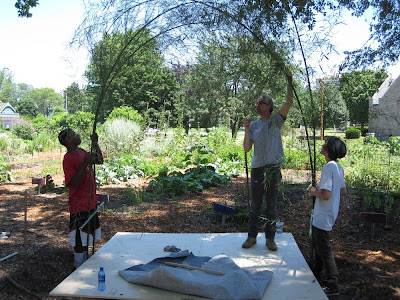

We were able to start Japanese Indigo (polygonum tinctorium) in the Toledo Botanical Garden greenhouse this year, which gave us about 75 beautiful seedlings to transplant to the Glenwood Garden where we work and play with students from local summer camps.


After the indigo was about a foot and a half tall, we harvested the plant, breaking it about 2/3 down the stalk (the bottom leaves will regrow for another harvest). We then stripped the leaves, rinsed them, and cut them into tiny pieces-- what you see Felicia and Heather doing above.


The cut leaves were put in a bin of cold water and stirred. After a half hour, the water started turning a spinach green, and a few minutes after that, began to get bluer. Magic from a plant! At this point the Boys and Girls Club students came, so they squeezed out the leaves to put in a new bucket of cold water, and put the pre-soaked wool yarn into the bin.
-- Pause for a shout-out --
The wool was acquired at a small farm that Brian and I encountered while driving through Indiana-- the Haxtons at Dor Galen raise goats, lamas, chickens, and breed sheep! Lorraine spins the wool on a traditional spinning wheel, and the yarn is beautiful and smells like sheep. We bought two varieties, a white wool from a Scottish Blackface/Hornet Dorset cross, and a darker brown from a Romney. I hope that some of the former came from this lady, as her name is Chunky Buns. Check out Dor Galen farm at dorgalen.blogspot.com
An hour after the wool was put in the bin, we took it out and put it in the second (identical) dye bath for another 45 minutes or so, squeezed out the water, and voila! I find it incredible that an otherwise unobtrusive green leafy plant that looks like a cross between a pepper and ladysthumb can create such a beautiful color!




















